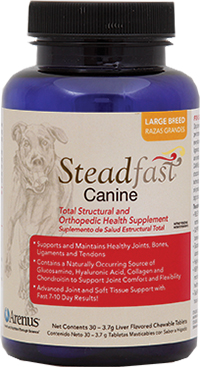As much as we like to believe that all trace mineral combinations, additives and supplements are the same, they're not. Your dog food or the grain you feed your horse may have a certain mineral on the label, but how much of that mineral is actually benefiting your animal? The reality is, in most situations, not much.
To begin, understanding the basic difference between a chelated mineral and a non-chelated one is important. Non-chelated minerals are what you will find in most nutritional supplements and feeds. These are easily spotted as they appear on labels with a suffix of "sulfate" or "chloride" because the mineral itself is bound to a salt for stability in the formula. For example, if you are evaluating the amount of zinc in a supplement, a non-chelated zinc will appear as "zinc sulfate." Non-chelated minerals are broken down quickly in your animal's GI tract, often before they reach the intestines (their intended absorption site), and rendered unable to provide your animal much, if any, benefit.
In contrast, chelated minerals are bound to carbon and, because of this, can also sometimes be referred to as "organic minerals." The carbon bonds in chelated minerals are much stronger than in salt-bound minerals and provide more stability for the mineral molecule itself, making it able to safely traverse the acidity of the stomach and reach the hindgut for absorption.

Dr. Ken Kopp explains further:
"The most common form of trace minerals used in horse feeds are inorganic mineral salts such as zinc oxide or copper sulfate. These are the least expensive forms of trace minerals and least bioavailable to the animal. The vast majority of inorganic trace minerals will never be absorbed out the horses’ intestinal tract. In fact, inorganic trace mineral salts have now become an environmental concern in the food animal industry. So much of the inorganic trace minerals are passing out in the manure that the environment is being polluted.
Inorganic mineral salts in the acidic pH of the horse’s stomach will break apart. For example, when copper sulfate reaches the horse’s stomach the copper will separate from sulfate. Then in the alkaline pH of the small intestine the copper can recombine with other molecules to form un-absorbable complexes. When this happens the copper will never be absorbed by the horse. This same problem occurs with zinc and manganese inorganic salts."


For most feed and supplement companies, chelated minerals are simply too costly to include so they opt for salt-bound, non-chelated minerals. Minerals such as zinc, copper, selenium and manganese play a significant role in animal nutrition, structural health in particular, so providing chelated versions of those in your animal's diet should be of the utmost importance.
Arenus utilizes a research proven, proprietary mineral formulation called TelaFIRM in its Steadfast Equine, Steadfast Equine Growth, Steadfast Canine and Eq-Well products. TelaFIRM is an expertly designed chelated mineral formulation and has been trusted and proven to:
- Increase bone breaking strength
- Increase mineral concentrations in bone
- Reduce tendon, ligament and cartilage problems,
- Reduce inflammation of the joint capsule
- Facilitate healing of injured bone and tissues
- Aid in the reduction of developmental defects
At Arenus, providing the very best, proven solutions for your animal is our mission. When creating our formulas, we include only the latest technology ensuring maximum benefit and long-term solutions, allowing you to enjoy a full and happy life with your animal.


